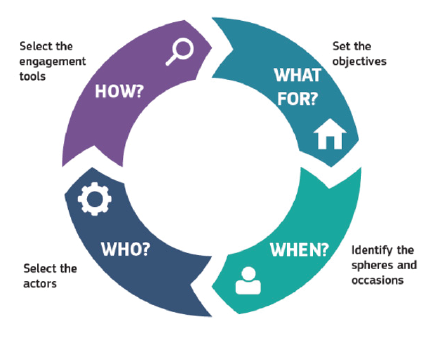19. Consulting and partnering with civil society
The 2030 Agenda for Sustainable Development and the new European Consensus on Development recognise the need for stronger and more inclusive multi-stakeholder partnerships. Engaging with CSOs, through dialogue and support, constitutes a key pillar in these approaches. For the EU, its commitment to enhanced dialogue and cooperation with CSOs is enshrined in several relevant policy documents.
In her mission letter to the Commissioner for International Partnerships, Jutta Urpilainen, President von der Leyen has emphasised the need ‘to have a dedicated focus on supporting civil society around the world. As the experts on the ground, they often lead the way on sustainable development. We should ensure they have a far greater role in designing and implementing European policies, programmes and projects.’ Correspondingly, in her mission letter to the Commissioner for Neighbourhood and Enlargement, Olivér Várhelyi, President von der Leyen pointed to the role of ‘an independent media and civil society’ in the EU’s Eastern neighbourhood.
These statements constitute strong signals over the past few years that civil society should be more involved in country level programming processes, such as joint programming. This chapter suggests possibilities for widening the scope and increasing the effectiveness of consultations with civil society in the joint programming process, notably by coming closer and being more coordinated with the CSO Country Roadmap process.
In a joint note on the Country Roadmap of EU engagement with civil society in 2018, DEVCO Director General Stefano Manservisi and EEAS Secretary General Helga Schmid, wrote that their ‘aim is that the re-launch of the Roadmaps will be done using a more coordinated approach with the joint programming process and the Human Rights and Democracy Country Strategies’.
Moving towards a structured dialogue with civil society
As a proxy for direct civic engagement, CSOs give a voice to citizens’ concerns and promote the culture and values of democratic governance. Equally, civil society informs and enriches the joint programming analysis and approach based on its ‘people and community’ perspective and as an important driver of change. Engaging in structured dialogue with CSOs ensures their inclusive and effective participation in policy processes.
Thus far, Team Europe have often used events (i.e. workshops, focus groups, sessions, etc.) either in the form of dedicated consultation events or ‘blended’ consultations to engage and speak to civil society as a joint European group. This risks becoming rather ad hoc, while experience has shown that an effective dialogue needs to be more structured and regular.
Structured dialogue requires identifying clear objectives, ensuring that the timing is conducive to preparation and follow up, assuring appropriate representation and participation, and designing the right approach.
Good practices in establishing a structured dialogue with civil society are part of the added value of the CSO Roadmaps. The Roadmaps are intended to improve the impact, predictability and visibility of EU actions promoting coordination and synergy with MS when partnering with civil society.
|
Image

|
In general, the role that civil society can play in joint programming depends on the democratic space available in a specific country context. While civil society can be integrated into policy dialogue alongside the government in a conducive environment, in more challenging contexts Team Europe may require a separate dialogue with civil society at country level, sometimes off the record, in order to better understand the concerns and challenges faced by CSOs and to avoid their being sanctioned by state authorities.
There are good experiences of CSO Roadmaps and of joint programming processes leading to more structured dialogue between civil society and European partners, as well as increasing local understanding of how European partners work and engage at country level both through political and policy dialogue and through official development assistance, including funding for civil society.
In many cases, the two processes would benefit from closer coordination as the CSO Roadmaps can offer deeper insights into the issue of the space for CSOs, while also offering avenues to deepen dialogue with, and streamline support to, CSOs. EU Delegations are therefore encouraged to find synergies between the two processes in a manner adapted to the country context.
These synergies could include joint consultations or joint reviews for the two processes in full respect of their distinct identity, in order to use resources more efficiently and to ensure clear communication on EU and MS interests and action, thus avoiding consultation fatigue on the part of civil society partners. Also, by using resources more efficiently, the consultation process could be broader and more ambitious and ensure a better involvement of civil society in joint programming processes. At the same time, care must be taken not to lose the good visibility that the CSO Roadmap has gained over the past years within the EU, among MS, and among external partners, in particular civil society.
The CSO Roadmap document is agreed in a separate local process by the EU Delegation and MS (and is also an annex to the Human Rights and Democracy Strategies at country level), and is often confidential in nature. However, key elements of the cooperation with CSOs — presented in the Roadmap — can be referred to in different parts of the main text of the joint programming document and the results framework. If considered useful by the Head of Delegation, some subset of the CSO Roadmap could also be locally presented in parallel to the joint programming document, pointing to synergies. This should all trigger increased coordination between the relevant sections of the EU Delegations and also between the EU Delegations and MS, as recommended.
Each section or chapter may be used separately to fulfil a specific need for guidance, which means there may be some overlap between the different parts of the document.
If you have any questions, you may contact the relevant helpdesk or functional mailbox:
- JOINT-PROGRAMMING-SUPPORT@eeas.europa.eu
- INTPA-JOINT-PROGRAMMING-SUPPORT@ec.europa.eu
- NEAR-JOINT-PROGRAMMING@ec.europa.eu
Recent updates
